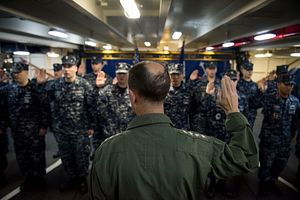U.S. Admiral John Richardson, the chief of naval operations (CNO), declared in an article at the National Interest that the U.S. Navy would no longer use the term “A2/AD” (itself a shortened version of “Anti-Access/Area Denial” as a stand-alone term for explaining the Navy’s operational purpose. Unsurprisingly, given our focus on East Asia, and on U.S.-China relations in particular, writers for the Diplomat have used this terminology extensively.
Buzzwords exist because they have utility and cease to exist when they are no longer of use to anyone. They are a form of the specialized vocabulary found in any profession, although the imprecision of the “national security analyst” community necessarily makes defense buzzwords less precise than they might be. The fuzziness of the community (and the associated buzzwords) stems from the fact that it extends across a wide range of organizations and specializations, from the military to the academy to the think tank family to the halls of Congress.
Admiral Richardson believes that the term A2/AD has come to obscure more than it illuminates. According to Richardson, the term is unhinged from the broader history of naval strategy, focuses too tightly on the idea of defensive bubbles, does not fully express the complexity of fighting inside and outside systems of defense, and has generally outlived its usefulness. Richardson calls for more flexible language for discussing that U.S. Navy’s needs and priorities in a variety of different theaters.
But buzzwords, as with all other forms of specialized jargon, are both deeply annoying and utterly necessary to conducting useful conversations about complex topics. As Phil Ewing (national security editor of NPR) said on Twitter, “”On one hand, we need impressive-sounding nonsense to convey danger. On the other, it can’t be so serious we ourselves can’t laugh it off.” Funny or no, that expresses a certain truth about the organizational (not to say political) necessity of shorthand like “A2/AD.”
I, for one, am unconvinced that “A2/AD” has become useless as shorthand for the system of systems that China (and other states) have developed to challenge U.S. military dominance. To be sure, A2/AD offers little new in the history of naval strategy, but it may effectively represent a particular manifestation of a long-running strategic problem. This manifestation is characterized by the threat of a previously unachievable degree of coordination between different tools of national defense, geared towards winning freedom of movement in a constrained maritime space.
Also, “A2/AD” takes up fewer characters than the various other terms for discussing the same concept, a virtue worth remembering in the Age of Twitter. In all likelihood, A2/AD will only fall away when the community that has invented it comes up with a new buzzword that more accurately fulfills the political and organizational niche that A2/AD has come to occupy. That may take a while.

































